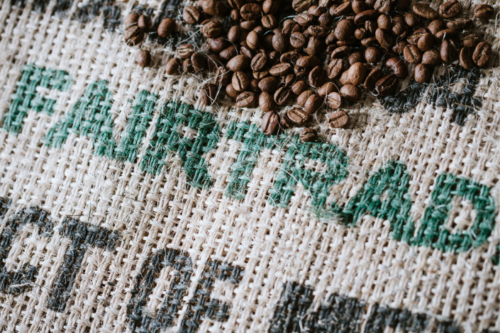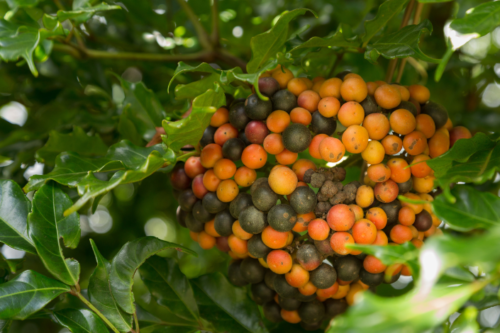The first time I learned that Hawaii produced coffee, I was astonished. However, the first time I bought Kona coffee and saw the hefty price tag, it literally made me wonder, “Why the f*** is Kona coffee so expensive?” In this article, I will delve into the reasons behind the high cost of Kona coffee and why it’s worth investing in this exquisite brew.
I’ve got years of experience shopping for Kona and I’m going to lay it all out here for you!
Why Is Kona Coffee So Freakin’ Expensive?
There are a few reasons why Kona coffee is expensive and the reasons are pretty legitimate. Let’s dive right in:
Factor #1: Handpicking and Processing
Kona coffee is not produced in bulk like other coffee varieties. It’s grown on the slopes of the Mauna Loa volcano in Hawaii, which has ideal soil and climate conditions for coffee cultivation.
However, Kona coffee cherries have to be hand-picked and the processing is super labor-intensive and time-consuming. Imagine that: they have to be hand-picked!
Each cherry is evaluated carefully so that only the ripest ones are harvested. After that, the beans are sun-dried and roasted to perfection to preserve their unique flavor profile. All these procedures contribute to the high production cost of Kona coffee. Cha-ching! I can hear my wallet getting lighter.
Factor #2: Scarcity and Demand
The overall production of Kona coffee is quite limited compared to other coffee varieties in the world. In fact, only a small land area on the Mauna Loa volcano is dedicated to Kona coffee cultivation.
Due to the high quality of the coffee and the limited supply, the demand for Kona coffee has skyrocketed over the years, leading to a surge in price. Plus, Kona coffee is an iconic Hawaiian product and has become a symbol of pride for the local community, which has also contributed to its rising popularity.
Factor #3: Quality Standards
Kona coffee is a premium specialty coffee that has a distinct flavor and aroma. To maintain its uniqueness and authenticity, Kona coffee farmers follow strict quality standards to ensure that every batch meets the industry’s highest expectations.
They have to adhere to specific farming practices, including shading the plants, using organic fertilizers, and avoiding certain pesticides. The attention to detail and adherence to quality standards lead to a superior product, but it also drives up the cost of production.
Factor #4: Certification and Labels

To protect Kona coffee’s unique reputation, the Kona Coffee Council has implemented strict regulations on its labeling. Any coffee labeled as Kona coffee must contain a minimum of 10% Kona coffee beans and should come from the Kona district on the Big Island of Hawaii.
Farmers and roasters who comply with these regulations can add the Kona Coffee Council’s seal on their products. This label is a guarantee of authenticity, but It also increases the cost of production and the final price of the coffee.
Factor #5: Sustainability and Community Support
Kona coffee is not just a product but also a way of life for the local community. The farmers and roasters involved in the Kona coffee industry are committed to preserving the environment and supporting the local economy. They often use sustainable farming practices and make a conscious effort to reduce waste and pollution.
Lastly, if you purchase Kona coffee, you are supporting the local community and helping them sustain a valuable niche industry.
What Is 10 Kona Coffee?
To be classified as 10 Kona Coffee, a coffee must consist of at least 10% of the finest quality Kona beans. It’s usually more expensive than other blends that contain smaller amounts of Kona beans.
Why Is Kona Coffee So Special?

Kona coffee is an exquisite blend of quality, taste, and tradition. The beans are harvested with precision and then roasted to perfection to preserve their unique flavor profile. Also, Kona coffee farmers adhere to strict quality standards and use sustainable farming practices.
This makes Kona coffee a worthwhile investment for any serious coffee lover; I know that this is important to me and I try to buy coffee that come from sustainable farming practices so if you like to do that as well, then feel good purchasing Kona!
Is There Any Other Coffee More Expensive Than Kona?
Yes, there are some other types of coffee that can be more expensive than Kona. For example, Jamaican Blue Mountain Coffee is one of the most sought-after coffees in the world and can be far pricier than Kona. There is also Kopi Luwak which is considered to be one of the rarest and most expensive coffees in the world. It comes from civets, wild cats that eat coffee cherries and then excrete the digested beans, which are collected for roasting.
Another expensive coffee is Geisha, which was first introduced in Panama. This coffee is renowned for its complex floral aromas and delicate flavor profile. It’s usually more expensive than Kona due to the difficulty of its production process.
Conclusion
Kona coffee is undoubtedly one of the most expensive coffee varieties in the world, but it’s also my opinion that it’s worth every penny because it’s freakin’ delicious!
Its unparalleled quality, unique flavor, and fragrance justify the high price tag. The production process is labor-intensive, and the quality standards are high, making it a rare and valuable commodity. Moreover, by investing in Kona coffee, you are supporting the local community and sustainability efforts so next time you sip your coffee, think about the journey of those beans and the care that went into producing it.